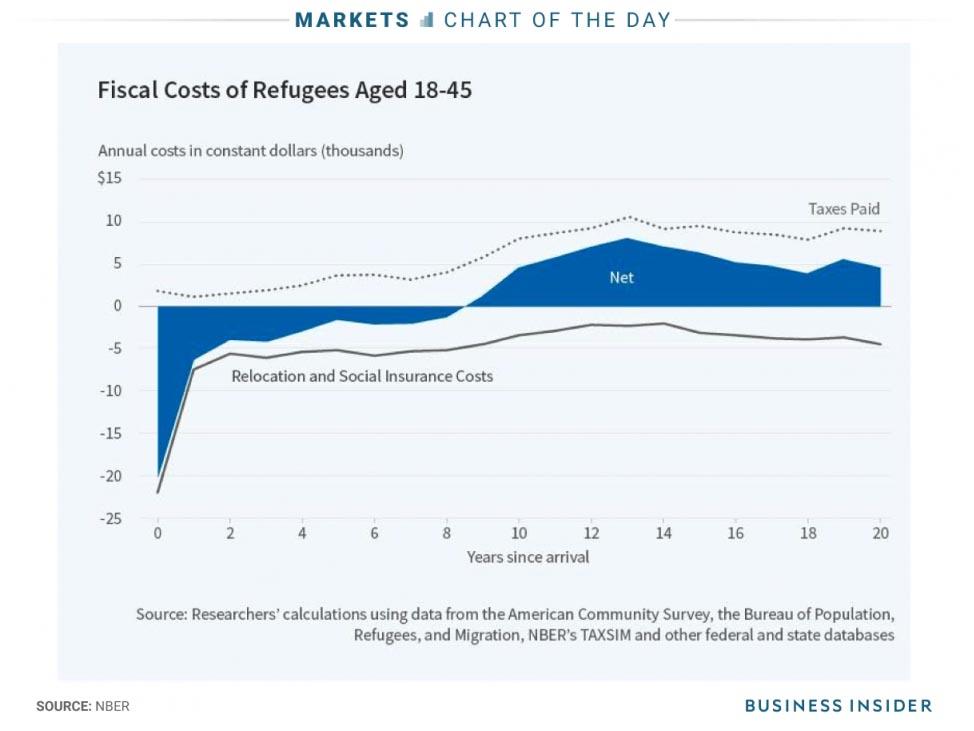Welcoming refugees brings unexpected economic benefits
A new working paper from the National Bureau of Economic Research shows refugees provide a net contribution to the economy through the taxes they pay over time

Your support helps us to tell the story
From reproductive rights to climate change to Big Tech, The Independent is on the ground when the story is developing. Whether it's investigating the financials of Elon Musk's pro-Trump PAC or producing our latest documentary, 'The A Word', which shines a light on the American women fighting for reproductive rights, we know how important it is to parse out the facts from the messaging.
At such a critical moment in US history, we need reporters on the ground. Your donation allows us to keep sending journalists to speak to both sides of the story.
The Independent is trusted by Americans across the entire political spectrum. And unlike many other quality news outlets, we choose not to lock Americans out of our reporting and analysis with paywalls. We believe quality journalism should be available to everyone, paid for by those who can afford it.
Your support makes all the difference.Donald Trump’s divisive ban on travel from several Muslim-majority countries has sparked a debate about not only the security implications of immigration but also its economic impact.
A new working paper from the National Bureau of Economic Research shows refugees provide a net contribution to the economy through the taxes they pay over time, countering the notion that they are a drag on the economy due to a reliance on social benefits.
Trump's ban initially faced stiff legal challenges, but was later upheld by the Supreme Court for a narrower group of immigrants.
Under Trump's plan, the maximum number of refugees allowed into the US in fiscal 2017 will likely decline from 110,000 to 50,000, according to Pew Research. About 3 million refugees have been resettled in the US since Congress passed the Refugee Act of 1980, Pew estimates.
The report from Notre Dame economists William Evans and Daniel Fitzgerald finds that “over their first 20 years in the United States, refugees who arrived as adults aged 18-45 contributed more in taxes than they received in relocation benefits and other public assistance.” The Notre Dame study drew on State Department data to create a sample of 20,000 refugees who entered the country between 1990 and 2014.
The authors also find that “the younger the refugees were when they resettled in America, the more likely they were to catch up with their native-born peers educationally and economically.”
This chart captures their findings, showing that refugees on average cross the threshold from net beneficiaries to net contributors around the 9th year after migration.

The research also found that refugees who arrived before the age of 14 had, by ages 19-24, graduated from high school at the same rates as American youth. By ages 23-28, those refugees displayed the same college graduation rates as the US-born population.
“Refugees who arrived as children of any age have much higher school enrolment rates than US-born respondents of the same age,” the research finds.
The US spends an average of $15,148 in relocation costs and $92,217 in social benefits over an adult refugee's first 20 years here, the NBER said, citing the Notre Dame report. Over that period, the average adult refugee pays $128,689 in taxes — $21,324 more than the benefits received.
And that’s just the economics of it. Trump’s case for a “Muslim-ban” during the campaign
• Inside the daily routine of billionaire Bill Gates
• The 50 most violent cities in the world
• What US intelligence knew about Adolf Hitler in 1943
Read the original article on Business Insider UK. © 2017. Follow Business Insider UK on Twitter.
Join our commenting forum
Join thought-provoking conversations, follow other Independent readers and see their replies
Comments